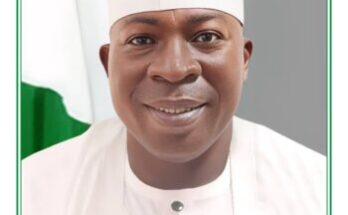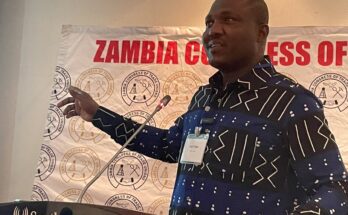Senator Iroegbu is a security consultant . In this chat with ENE OSANG he bares his mind on the current security situation calling on the new administration to see the need in bringing women on board security deliberations
What is your reaction to the current security situation, particularly the spate of banditry in Zamfara, Katsina, Kaduna and other states?
The security situation is appalling and unacceptable. We must not come to a situation whereby we accept what is currently going on across the country especially in the three geopolitical zones in the north as the norm. It must be defeated both kinetically and non-kinetically especially psychologically.
The country is spiralling out of control economically and security wise and we are increasingly witnessing a violent and militarised society which like I stated earlier is unacceptable. We must not accept a situation whereby life is cheap in the country and we end up embracing a militant society where might is right.
Like I rightly stressed, we must not accept the menacing situation but must not also pretend as if these problems do not exist as relevant agencies, officials and stakeholders would want us to believe at times. The security agencies are obviously trying to curtail the situation but as you can see, their best is not enough and the approach to our ever expanding state of insecurity has been reactionary at most and ad hoc at best. Coupled with the fact that our military men are overstretched, policing elements underutilised, actionable intelligence scarcely deployed and worst of it all, our security architecture is obsolete vis a vis the emerging 21st century security challenges. But there is hope and signs that we can get it right if we set our minds to it as some past experiences of Nigeria at various stages of the nation’s history has proved. The nation has always triumphed but the question is at what cost and more importantly, were there any lessons learned from those past experiences to avoid or mitigate the present situation?
Unfortunately, women and children bear the brunt of these conflicts across the country as they are more vulnerable to the vagaries of conflict. This also demands that women should be factored into seeking sustainable solutions to the state of insecurity.
There were reports that terrorists were being paid better than security personnel. Can this be true going by current happenings?
From the prevailing situation, it does seems that the security measures though commendable are not enough. It must be noted that with the available resources and personnel, our security agencies, especially the military are doing commendably. However, a lot is still left to be desired in the area of strategic and operational decisions. Most of the problems are systemic in nature in that the problems across the country are self inflicted from structural perspectives, hence have overwhelmed the current security architecture. We need more boots on ground that is more personnel, not just that but well trained and experienced ones, more resources, equipment and ammunition, reforms in our security and leadership. More important also is the restructuring of our security, economic and socio-political architecture to bring security closer to the people in order to encourage ownership and citizens participation in internal security operations across the country. This also brings to the fore the advocacy for the state community policing.
Tell us about WANEP advocacy on UN Security Council Resolution 1325 which you are a part of?
WANEP has developed various advocacy mechanisms towards the localisation and implementation of the United Nations Security Council Resolution (UNSCR) 1325 in Nigeria to assist it to effectively implement National Action Plan (NAP). To this end, it has engaged government agencies, CSOs and especially the media component as key players in implementing the Women, Peace and Security (WPS) resolutions in the country. This is in recognition of the fact that media support is necessary to build public awareness and generate broad-based support for the implementation of the agenda as well as to keep the authorities accountable for their obligation to implement the UNSCR 1325 through NAP. Therefore, implementing NAP requires raising the national and local journalists and media practitioners’ awareness on the WPS resolution agenda and their role in promoting it as well as their capacity to report on the implementation of the Women Peace and Security (WPS) agenda in an engaging way. These objectives informed the recent media strategy for Nigerian journalists and media practitioners, championed by WANEP-Nigeria with technical inputs and support from the Global Network of Women Peace builders (GNWP) and funded by the Global Affairs Canada.
Recognizing the key role of the media in the implementation of WPS, GNWP in collaboration with WANEP-Nigeria has to this effect, organised Media, Women, Peace and Security training workshops in 2019, which brought together journalists and other media practitioners to raise their awareness of the importance of UNSCR 1325, and their role in ensuring its effective implementation in Nigeria. The workshop included hands-on exercises resulting in a drafting of the national media strategy on WPS I talked about earlier.
Building on the outcomes of the workshop, the media Strategy x-rayed the prevailing media landscape in Nigeria, with the conclusion that it is patriarchal and male-centric with no deliberate policies and efforts to project women related issues in the front burner, especially in the area of security and peacebuilding. Against this backdrop, there were concrete recommendations as well as the professional and personal commitments made by the participants of the workshop form core of the media strategy. There have been outstanding results in this regard.
So far, how would you assess the implementation of UNSRC 1325 in Nigeria?
So far, my assessment is that government is just paying lip service and no deliberate efforts are made to empower women to take their rightful place in politics, security and peacebuilding. The affirmative action for women participation in governance has taken a turn for the worse with the outcome of the 2019 elections where the little gain made before were eroded. Today, fewer women were either elected or appointed in the political economy of the country. They have been relegated to largely the periphery.
Like you said, women have always been relegated to the background, do you think the advocacy for their inclusion in matters of security is sacrosanct?
This is achievable if government and political parties take deliberate efforts and policies to encourage more women in governance. There is an increasing and encouraging role of women at the civil society and private sector but they are still largely marginalised at the governmental cycles especially in the area of peace and security where all the heads of relevant agencies are headed by men.
Why should women be included in security deliberations and what roles do you think they can play in ensuring peace and security in the country?
Women and girls make up about 50 percent of our population and hence as a matter of inclusion, equity, fairness and justice as well as gender equality, they must be part of the security architecture in the country. In addition, women bring a different perspective to the concept of peace and security and could therefore, be a reliable source for sustainable peace.From the societal structure, women wield enormous influence over their sons, husbands, boyfriends and brothers as well as understand better both sides of gender perspectives on these issues. They could be a stabilising and calming force in a volatile masculine driven conflicts.In addition, they are also alongside their children, mostly the victims of these crisis and would therefore, be more passionate and resolute in seeking for a more sustainable solutions to peace.
What then would be your call to authorities particularly the new administration concerning the full implementation of UNSRC 1325 in Nigeria?
My call is for the government to fully follow through with the guidelines and targets provided in the NAP towards the actualisation of the UNSCR 1325 in Nigeria.I will also advise all stakeholders on women, peace and security to remain committed, continue in the advocacy and encourage government to play its part.



